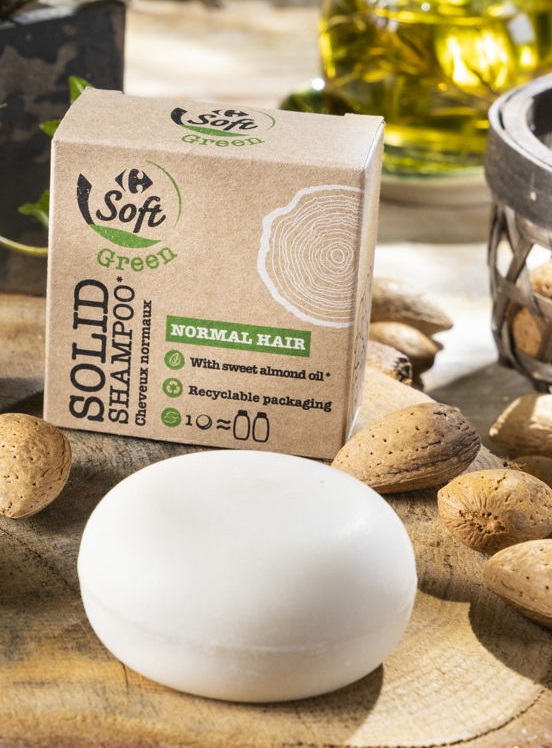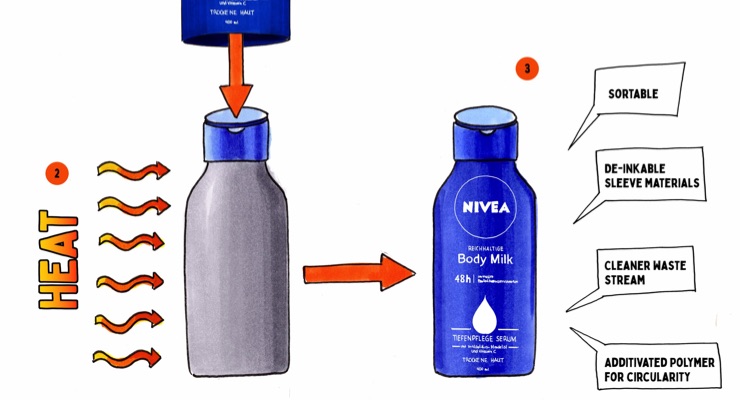Circularity is taking off in the cosmetics industry, with many new launches involving sustainable products, ingredients, and packaging. Such developments are helping the industry make the transition to a circular economy, however there are concerns about customer behaviour.

Many new product launches involve waterless cosmetics. Brands are launching shampoo bars, solid moisturisers, sheet masks & related products. By not containing water, such products have lower environmental impact as they require less packaging, have lower transportation and distribution costs, and can be self-preserving.
Garnier, Aveda, and Klorane are some of the established brands launching waterless products in the last couple of years. Carrefour, France’s leading food retailer, has also launched a waterless line under its Soft Green private label. In June, P&G announced that it will launch solid shampoos & conditioners under its Head & Shoulders, Pantene, Herbal Essences and Aussie brands.
Waterless innovations are now spreading to colour cosmetics. Lush is the frontrunner, with its Naked range of products. It launched Naked Slap Stick foundations in 2018, and now has concealers, lipstick and mascara.
Pinch of Colour and Axiology are dedicated brands of waterless colour cosmetics. Newcomers like SBTRCT are marketing their products on circular attributes, such as plastic-free, zero waste, as well as waterless.
To close their packaging loops, brands are moving away from single-use plastics. Refillable packaging is becoming prominent. Terracycle has expanded its Loop platform for refillable packaging to various countries. Labelled the circular reuse platform, Loop works with cosmetic companies & retailers so consumers can return product packaging for re-use.
In the deodorants sector, innovations are involving refillable packaging. Fussy and Wild Cosmetics are UK brands that have launched sustainable deodorants in refillable deodorants. Fussy deodorants have clean formulations and are housed in plastic-free compostable packaging; the products are marketed as the ‘next generation’ deodorant.
Upcycling is becoming popular as cosmetic brands and ingredient firms look to valorise waste streams. Leading ingredient firms, such as Dow Chemical and Laboratories Expanscience, are using food byproducts to create new natural ingredients. Fruit kernels, vegetable peels, and coffee grounds are some of the waste materials used. The Finnish start-up Innomost is making cosmetic ingredients from birch bark side streams. Dr. Craft, O’right, and Kadalys are some of the brands developing dedicated product ranges with ‘repurposed ingredients’.

The move towards circularity is also encouraging collaborations. Clariant, Beiersdorf, Borealis and Siegwerk have teamed up to create circular packaging innovations. The Design4Circularity initiative has created a colourless polyolefin bottle made from 100% post-consumer recycled material. The packaging materials can be recovered and fully recyclable for the same application.
The circular beauty trend is gaining impetus in the cosmetics industry. Ecovia Intelligence believes its success will hinge on customer behaviour. Shoppers will buy novel products if they are aware of their sustainability merits. Consumers also need to be educated on how to use waterless products, what packaging to recycle, where and how to refill. The cosmetics industry is making sustainable products, however are consumers being prepared for them?
Sustainable Cosmetics Summit
Waterless cosmetics, upcycled ingredients, refillable packaging, new packaging materials, and customer behaviour are featured at the Sustainable Cosmetics Summit. Lush, Terracycle, SBTRCT, Clariant, Dow Chemical, L’Oreal (Garnier), Fussy and Kadalys shared their experiences at the European edition. More details are on the website
Posted: October 12th 2022
For permission to publish our research insights, please contact our media department

